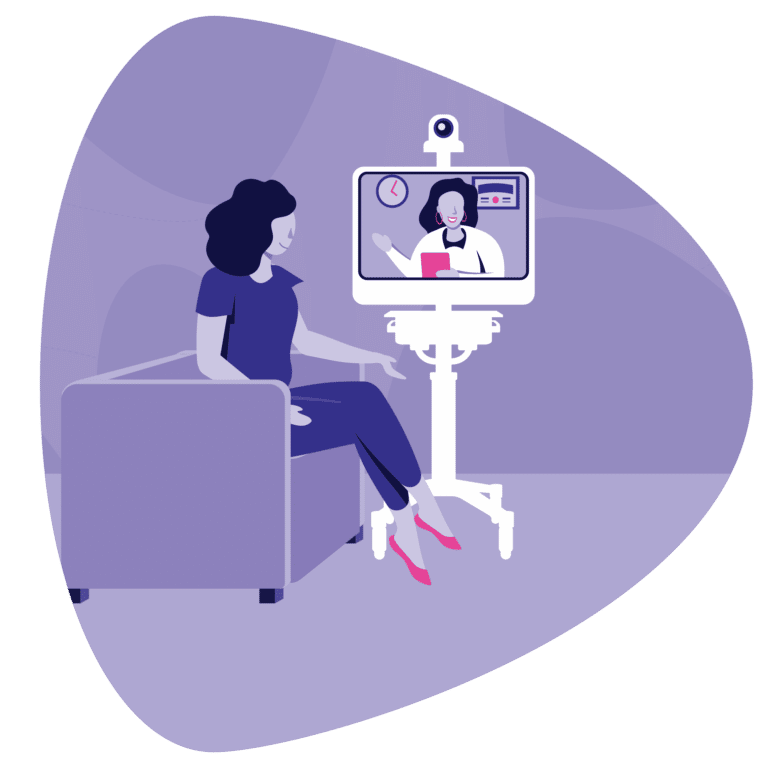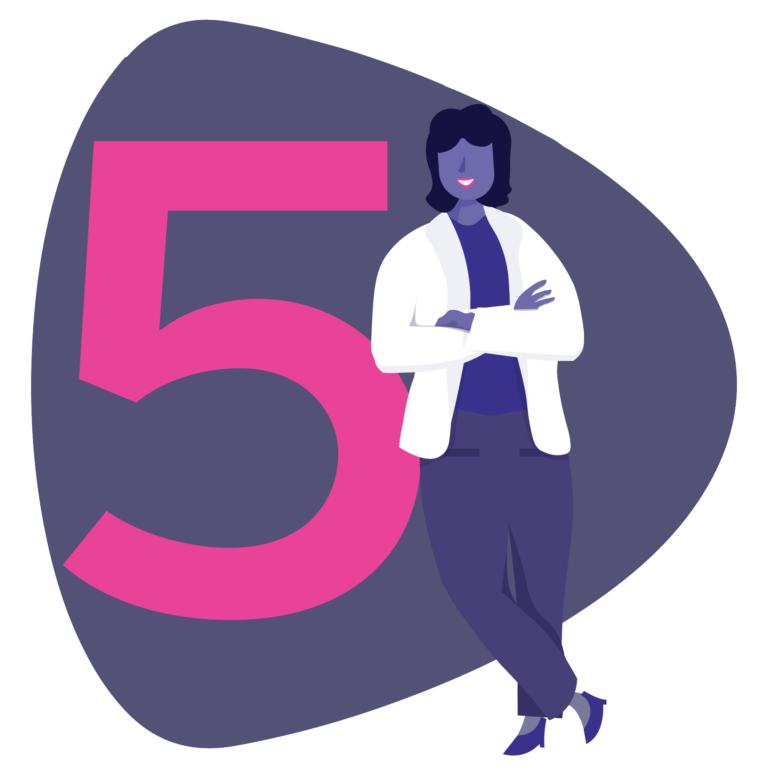Iris clinicians are at the heart of what makes our organization such a special place to work. That’s why we’re turning the spotlight on the amazing work they’re doing every day. This month, we’re sitting down to talk with Dr. Jean Oelschlager.
Q. How did you find Iris and decide you wanted to be an Iris provider?
A. I retired from my position in Wisconsin with community mental health in 2020 amid the pandemic. We moved to Arizona, and I planned to volunteer out here. During the pandemic, no one was accepting volunteers, particularly older volunteers. I thought I couldn’t just sit at home all the time. I needed to do something productive and useful. I thought about doing locums work again because I had done that work in the past, and I reached out to a couple of the companies I worked with, and they didn’t have anything that worked for me.
I wasn’t looking for a full-time job. I was looking for something where I could work two or three days a week because I wanted to retire or semi-retire. That didn’t pan out. I thought maybe I should check into telehealth.
I found Iris listed and read more about it. The more I learned about Iris, the more it seemed like it was a good fit for me because they were willing to be flexible with part-time hours, with the possibility that I might want to return to Wisconsin in the summers.
I like the mission to provide services to underserved areas. I like that Iris was started by a psychiatrist who saw this need and stepped up by starting the company. All those things were appealing, and the people I talked to were lovely, helpful people. It seemed like a really good fit. The process started at the beginning of 2021, and by September 2021, I started with the clinic in Missouri.
Q. How does telehealth compare to in-person care?
A. I’ve learned how to communicate better in the virtual world with patients. You have to be more tuned into eye contact and be more verbal about what you’re doing when you’re looking away so they know what you’re doing if you work with two screens.
I have one screen for the Zoom call and the other for the medical record. I’ll tell them if I’m doing something else, like ordering medications. They can see that when you’re in an office setting, but they can’t when you’re virtual. You have to be more mindful to let patients know when you’re not looking at them what’s happening. You give them time for them to answer.
The other thing that has worked well with my setup with Iris and the clinic in Missouri is that patients come into the clinic.
I don’t do virtual visits in their homes. They come in and get their vitals. We do PHQ-9s and AIMs, and then the nurse scans it so that I can see everything. I have a designated nurse that I’ve worked with throughout my time at the clinic. She knows my routine. She’s that physical presence for me, an extension of me. And that has worked really well.
Because sometimes she can see things that I can’t necessarily see and can alert me to that. I know not every situation with telehealth works that way, but I’m really happy that’s how it worked out. I value that team approach and that she’s there in person to connect with patients and see things that I might not catch virtually.
Q. How do you foster connection with patients virtually?
A. Eye contact is probably the biggest thing. Also, using the staff that’s physically present in the clinic to reach out to patients. For example, we had a patient who had postpartum depression, and I was concerned about her. We connected her with one of our therapists, who contacted her between my visits to see how she was doing.
The other thing that’s really nice about my setup is that it’s a primary care clinic. So most of the providers in the clinic are primary care, and then they have a behavioral health and substance use department, too. It’s happened more than once that a patient comes in to see me, and they are medically ill. They either have an upper respiratory infection or a UTI, or something needs to be addressed.
My nurse will try to get them in to see one of the primary care providers around our appointment. That way, the patient (particularly if it’s a more acute situation where we’re really concerned about them) can be seen and get their issue addressed either right before I see them or right after. That holistic approach creates a good relationship with patients that they appreciate. I appreciate it, too, because I know they’re getting their needs met in other areas.
Q. As a healthcare professional, how do you manage work-life balance?
A. The biggest thing is that at my stage now, I can say I’m only going to work two days a week. That was really an important part of coming back to work. I had been doing this for 30+ years and wanted to do other things, not just work full-time. That was one of the things with doing telehealth and joining Iris, was Iris being flexible enough to say, “Yes, we can find something where you can just work two days a week.”
I wasn’t interested in doing call anymore. I did that for years – been there, done that. I put my time in doing call. I wanted something where I could do outpatient work a few days a week without worrying about the call.
Not to say that I never would get a call. There have been instances where a question came up on a patient, and the clinic would call me on my non-work days. But that’s extremely rare. It may only have happened a couple of times in the two years I’ve been working.
Being able to do just the two days a week has worked really well because it’s allowed me to do other things. One of the things we enjoy doing out here is hiking. We’ve got a hiking group that we do regularly—staying active. The climate here is conducive to that, except in the middle of July.
Even then, you have to get up really early. I still do that and walk at least two miles daily every morning. I just get up really early when it’s hot. I think what we tell our patients is to stay healthy. Work is important, and I think that it helps me to stay mentally active, feel productive, and like I’m still contributing.
I’m volunteering at a couple of places, which has been great meeting the people in the community, making new friends, and staying active socially. All those things are important.
Q. What is the most rewarding part of your job?
A. I would say seeing patients get better or having that “aha moment” where they connect how they can change their thinking or behavior that will make life better for them.
Q. What do you love about working with Iris?
A. The flexibility. The staff I’ve worked with have been wonderful and helpful—for example, the IT folks. I’ve had a couple of times where stuff didn’t work, and I was sending texts because of the time difference between Missouri and Arizona. I was texting them early in the morning, “This isn’t working, and I have patients starting at this time. I need help right away.” Then, within minutes I was getting help.
That’s been consistent because it’s happened several times. I’m not a tech guru by any means, and that’s probably my greatest anxiety is wondering, “What’s going to happen with the computer? Or, is there going to be some upgrade or downgrade?” The IT staff have been wonderful. The supervisory folks, like Melissa Kennedy are wonderful.
I had an accident where I was hit by a car while I was out walking last year, and I broke my back, leg, and pelvis. I was in a wheelchair for six weeks. Iris was very understanding, and the clinic understood that I had to get better. After three weeks of not working, I was so bored because I was wheelchair-bound.
The clinic and Iris helped me figure out a schedule where I would work just a few hours a day. I’d work a couple of hours, then I’d rest a couple of hours, and then I started seeing patients again after three weeks, even though I was still in the wheelchair. That’s another example of the flexibility that I value both with the clinic and with Iris. That was wonderful.
I’ve had a miraculous recovery, and that’s amazing. I feel very blessed, but that was being able to just work a little bit for probably a month to six weeks until I was more ambulatory. That was good for my mental health, too. Because I was homebound, unless my husband would load me up with a wheelchair to take me somewhere, which was a big to do, that flexibility was very important and helpful.
Q. What advice would you give someone new to telehealth?
A. I would say find the right company that will support you. It’s important to have a team behind you to help with credentialing and vetting potential clinics that you might be working for. The IT component – Iris has been great about providing the equipment and helping with getting licensing and malpractice coverage. I think that’s probably my biggest thing is just finding the right fit with a company that can give you that support and help getting started.
At Iris, we believe our providers should be respected, valued, and applauded for the work they do, and we couldn’t be more proud to say, “thank you” to our very own Dr. Jean Oelschlager. If you’d like to learn more about working for Iris Telehealth, contact us today.

